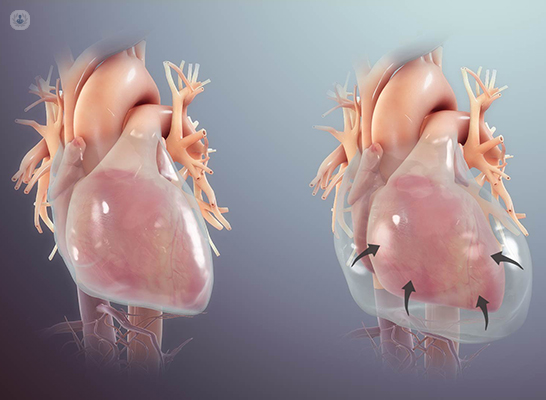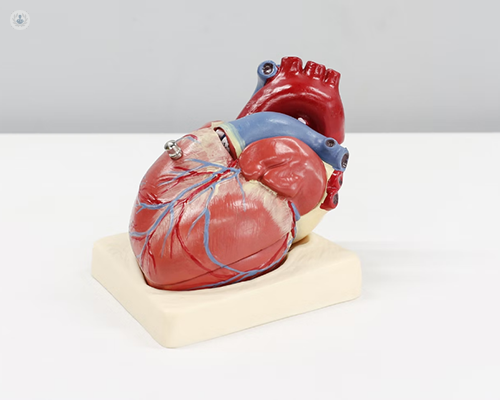Pericarditis
Dr Alexander Lyon - Cardiology
Created on: 11-13-2012
Updated on: 10-25-2023
Edited by: Jay Staniland
What is pericarditis?
Pericarditis is the inflammation of the pericardium, which is the thin outer sac that surrounds the heart. The pericardium holds the heart in place and helps it to function properly. The pericardium is made up of two thin layers of tissue, which are separated by a fluid. Pericarditis can be either acute, chronic or recurrent.
Acute pericarditis comes on suddenly, and the symptoms don't last long.
Chronic pericarditis develops slowly over time, and usually requires a longer course of treatment.
Recurrent pericarditis is when symptoms of pericarditis persist after the first episode, however patients usually feel fine in between episodes.
Common symptoms include chest pain, which is acute and subsides quickly. Often cases of pericarditis will improve on their own, but more severe cases do require treatment.
Pericarditis is diagnosed and treated by a cardiologist.

What are the symptoms of pericarditis?
Symptoms will vary depending on what type of pericarditis you are experiencing. Pericarditis may be acute, chronic or recurrent. Possible symptoms include:
- Sharp, throbbing pain over the middle or left side of the chest. Often this intensifies when inhaling, coughing or lying down. This pain usually lessens when sitting up or leaning forward.
- Dull ache in the chest.
- Palpitations.
- Fatigue.
- A dry cough.
- Swelling in the ankles, legs, feet or abdomen.
- Mild fever.
- Symptoms associated with low-blood pressure, such as dizziness, light-headedness and fainting.
What causes pericarditis?
The cause of pericarditis can be difficult to determine. It is often due to an infection (viral, bacterial, parasitic or fungal). Viruses are the most common cause of the condition. Additionally, pericarditis can be caused by:
- Complications following a heart attack or cardiac surgery
- Trauma from a chest injury
- Other health problems (e.g. AIDS, tuberculosis, kidney failure or cancer)
- Some medications, such as corticosteroids
- Autoimmune conditions such as lupus, rheumatoid arthritis or scleroderma
Sometimes the exact cause of pericarditis is unknown and seems to have occurred for no reason. This is known as idiopathic pericarditis.
How is pericarditis diagnosed?
A diagnosis will begin with a thorough assessment of your medical history and your symptoms, as well as a physical examination. Your doctor will most likely ask if you have recently been sick with one of the diseases that can cause pericarditis.
During the physical examination the doctor will listen to your heart with a stethoscope. When the lining of an inflamed pericardium rubs together it can cause a creaking sound. This called “pericardium rub”.
A cardiac MRI may also be used to check for signs of inflammation or extra fluid in the pericardium. It is likely you will have an electrocardiogram (ECG), echocardiogram, X-ray and a CT scan to exclude other possible causes of your chest pain.

What is the treatment for pericarditis?
Treatment depends on the severity of the symptoms and whether it is acute or chronic. It also depends on the underlying cause of the pericarditis. Mild cases will usually improve on their own without treatment.
If medication is given, you will likely take NSAIDs, such as ibuprofen or colchine. NSAIDs work by reducing inflammation. You may also be prescribed corticosteroids.
If the cause is a bacterial infection, antibiotics will be given.
If you are suspected of having a complication (e.g., cardiac tamponade or chronic constrictive pericarditis), you may need a surgical procedure. This surgery will completely or partially remove the pericardium, and is known as a pericardiectomy.
Can pericarditis be prevented?
There is no conclusive way of completely preventing acute pericarditis. However, there are a number of ways to prevent recurrent or chronic pericarditis. Treating the first bout of acute pericarditis as quickly as possible is one of the best ways to prevent the condition from worsening.
It is also imperative that you follow your doctor´s treatment plan, avoid strenuous exercise and rest as much as possible until you have made a full recovery from acute pericarditis.
Can pericarditis come and go?
Pericarditis can come and go in some patients, which is known as recurrent pericarditis. It is thought that initial viral infections or immune system dysfunctions (e.g., lupus, rheumatoid arthritis) could be responsible for recurrent pericarditis.
It could also develop due to a patient´s first episode of pericarditis not receiving adequate treatment. Other possible causes include complications after a heart attack or cardiac surgery, or a history of corticosteroid use.

Can pericarditis be fatal?
Pericarditis is seldom fatal, but in very rare cases it can cause complications that lead to death. Complications may arise if pericarditis is left untreated.
These complications include constrictive pericarditis which is the permanent thickening and contraction of the pericardium, preventing the heart from working properly. Another complication is cardiac tamponade which results in too much fluid collecting in the pericardium, preventing the heart from filling properly with blood.
If these complications are left untreated, they may lead to death.
Which specialist treats pericarditis?
Cardiologists are responsible for diagnosing and treating pericarditis and other heart conditions. The heart is one of the most important organs in the body, and it is essential that it is healthy for the rest of your body to function properly. Cardiologists work to ensure that the heart remains healthy, and treating any heart disease or abnormality that may affect the patient´s quality of life.







